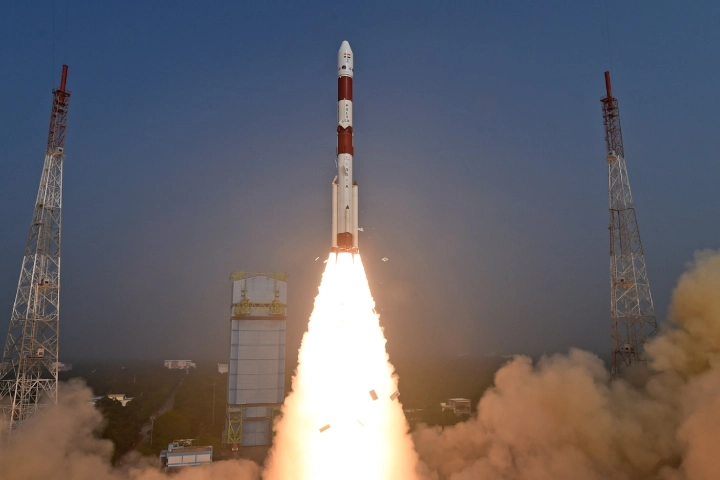

ISRO launches India's 1st X-ray polarimeter satellite mission to study black holes (Photo: @isro)
India on Monday ushered in the New Year in a grand manner by orbiting its X-ray Polarimeter Satellite (XPoSat) ISRO and the space agency will also test its fuel cell, a precursor for powering the Indian space station whenever it is built.
At about 9.10 a.m. on the first day of the calendar year 2024, India’s Polar Satellite Launch Vehicle-C58 (PSLV-C58) standing 44.4-metre tall, with a lift off mass of 260 ton blasted off from the first launch pad at the Satish Dhawan Space Centre, here.
The rocket carried XPoSat and 10 other experimental payloads on its fourth stage.
Slowly rising up towards the skies with a thick orange flame at its tail, the rocket gained speed with a sound resembling rolling thunder and went up leaving a thick plume while the people assembled at the viewing gallery clapped their hands with pride.
Interestingly, this is the first space mission for the Indian Space Research Organisation (ISRO) on January 1.
At about 21 minutes into its flight, the rocket ejected XPoSat at an altitude of about 650 km.
Speaking after the launch ISRO Chairman S. Somanath said: “The orbit accomplished for XPoSat is excellent as the deviation is just three kilometres. The solar panels of the satellite have been deployed.”
After orbiting the XPoSat, the rocket’s fourth stage — PS4 stage — will be lowered to 350km, about 9.6 degree orbit, by restarting it twice. The Indian space agency will now use the fourth stage as an orbital platform with 10 experimental payloads loaded on it.
“We could have done the experiments at the 650km altitude. We decided to bring down the stage so that we don’t create more space debris,” Somanath said.
Continuing further he said, the remaining fuel on the fourth stage will be dumped in an unique manner.
The left-out propellant in the PS4 will be disposed of through the main engines as a precursor to enabling the safety of the PS4 stage in atmosphere reentry experiments planned in future, ISRO said.
The oxidiser will be let out first followed by fuel in a predetermined sequence of operations. The existing scheme of spent stage passivation by venting the tank pressure will also be active.
Post passivation of PS4, the control of the stage is transferred to the PSLV Orbital Experimental Module-3 (POEM-3) avionics, the ISRO said.
The POEM is configured as a 3-axis stabilised orbital platform for conducting experiments to space qualify systems with novel ideas.
The orbital platform’s electrical power requirements are catered by a Flexible Solar Panel in conjunction with 50Ah Li-Ion battery in battery tied configuration.
The orbital platform consists of avionic systems to take care of navigation, guidance, control and telecommands and Orbital Platform Attitude Control System to cater to control of the platform to test the payloads, the ISRO added.
The 10 payloads are from TakeMe2Space, LBS Institute Technology for Women, K.J. Somaiya Institute of Technology, Inspecity Space Labs Private Ltd, Dhruva Space Private Ltd, Bellatrix Aerospace Private Ltd (two payloads) and three payloads from the ISRO.
According to Somanath, ISRO will be testing its fuel cell which will be the precursor for powering the Indian space station whenever it is built.
The Indian space agency will also test its silicon based high energy cells.
The XPoSat is the first dedicated scientific satellite from the ISRO to carry out research in space-based polarisation measurements of X-ray emission from celestial sources. The satellite configuration is modified from the IMS-2 bus platform. The configuration of the mainframe systems is derived based on the heritage of IRS satellites. It carries two payloads, namely POLIX (Polarimeter Instrument in X-rays) and XSPECT (X-ray Spectroscopy and Timing).
The POLIX is realised by the Raman Research Institute and XSPECT is by the Space Astronomy Group of the U.R. Rao Satellite Centre (URSC).
According to the ISRO, the three objectives of XPoSat are:
(a) To measure polarisation of X-rays in the energy band 8-30keV emanating from about 50 potential cosmic sources through Thomson Scattering by POLIX payload.
(b) To carry out long-term spectral and temporal studies of cosmic X-ray sources in the energy band 0.8-15keV by XSPECT payload, and
(c) To carry out polarisation and spectroscopic measurements of X-ray emissions from cosmic sources by POLIX and XSPECT payloads, respectively, in the common energy band.
In its normal configuration, the PSLV is a four-stage/engine expendable rocket powered by solid and liquid fuels, alternatively, with six booster motors strapped onto the first stage to give higher thrust during the initial flight moments.
The ISRO has five types of PSLV rockets — Standard, Core Alone, XL, DL, and QL.
The major difference between them is the use of strap-on boosters which, in turn, largely depends on the weight of the satellites to be orbited.
The PSLV uses 6,4,2 solid rocket strap-on motors to augment the thrust provided by the first stage in PSLV-XL, QL & DL variants, respectively. However, strap-ons are not used in the core-alone version (PSLV-CA).
The PSLV rocket that flew on New Year Day was the DL variant with two solid booster motors.
India could have inflicted more damage while retaliating to Pakistan's terror attacks with 'Operation Sindoor'…
Sikkim has decided a democratic future for itself 50 years ago and over these 50…
Panama's Foreign Minister Javier Martinez Acha on Thursday backed India for a permanent seat in…
US Congressmen Raja Krishnamoorthi opposed the Donald Trump administration for freezing student visa interviews amid…
A grand welcome celebration for Ayodhya Shri Ram Lalla was organized by the Ayodhya Shri…
The Foundation stone for the construction of the Agriculture Promotion Centre for Food Grains Collection…